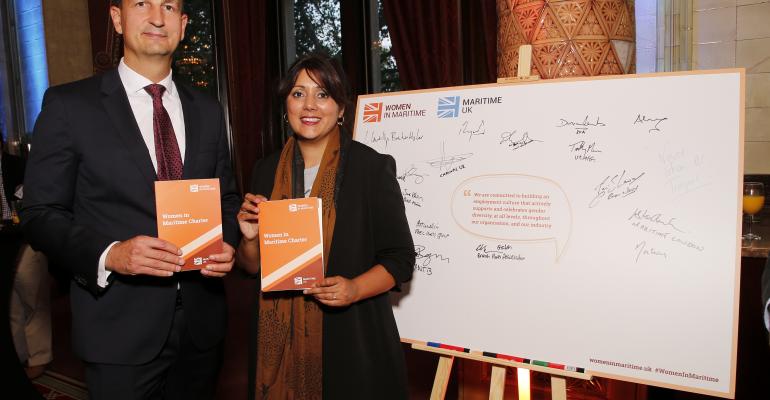He was speaking at the launch of the new Women in Maritime Taskforce Charter, an initiative to encourage more women to take up roles in the industry, and one which more than 60 companies across shipping, ports, engineering and naval forces have already pledged to support.
“We are failing to fully harness the talents of 50% of the population. It doesn’t make sense and there is a dire need to change this,” said Pedersen. He noted that ABP’s own workforce is 15% women, and the group is proactively encouraging more women to apply. For him, he said, it’s personal – he reflected on the “unreasonable obstacles” his wife has had to overcome in her career and, as the father of two daughters, “I want them to have equal opportunities in their work life.”
At the same time, diversity is good for business, he added. ABP’s focus on diversity was delivering a much stronger company, “with different voices listened to”.
Recruitment and retention
Established by Maritime UK, the taskforce has identified Recruitment, Progression, Retention and Total Package as key areas of focus. There are plans for workshops on unconscious bias, for sharing best practice on the role of job description language in attracting women applicants, and for sharing of HR personnel between companies.
The workforce should reflect the population of the UK, but there are often barriers to diversity, said UK Shipping Minister Nusrat Ghani. “The creation of the charter means organisations can now move forward from a ‘show of intent’ to take practical steps to achieve gender balance,” she said. “It is my greatest wish to see the maritime sector shining a beacon on equality and I look forward to the move from intent to action. There is nothing to hide behind now.”
Julie Lithgow, director of the Institute of Chartered Shipbrokers, said: “I joined this (taskforce) team because I was prepared to be the most cynical person in the room.” However, she said, at every step of the journey, the team had met with increasing enthusiasm. “We have learned from other sectors and we consulted the industry on our proposals. We hope the charter strikes the right balance between challenge and support.”
Hosted by ABP at One Whitehall Place in London, this was an evening of professionalism, respect and positivity, attended by more than 100 government, local authority and industry representatives. It featured an impressive, forceful video illustrating the huge range of opportunities across our industry. For once, it was an event not dominated by men in grey suits.
How far we need to go
Time to reflect on how far we have come … but also, in some instances, how far we still need to go.
An esteemed colleague in the forwarding world recently told me he can recall the men at a freight industry lunch being instructed to stand up and toast “the ladies – and don’t they look pretty”.
It’s only a few years ago that I attended a similar function which was addressed by some 1970s footballer thus: “I see we have some ladies in the audience. Well, done ladies!”
In January, I was invited to BIFA’s annual lunch and awards ceremony in London. An enjoyable occasion, and it was good to see excellence and expertise in logistics recognised and rewarded.
Looking around the 40 or so tables, the ratio of white, middle aged males to – well, anyone else – showed only too clearly how far we have to go. On the plus side, the guest speaker was celebrity chef and musician Levi Roots – what a delight not to be bored to death by yet another ex-footballer (or referee).
And then we got to the raffle. The prizes – a double classic car drive plus high-speed passenger ride; a voucher for Caterpillar merchandise; and a Volvo Trucks 50th anniversary jacket. This was still a very “blokey” affair. One young female freight forwarder on my table dutifully bought her raffle tickets and said: “I really hope I don’t win any of that …”
It’s not that I am suggesting ‘girly’ prizes or that women don’t like driving fast. But for an industry that talks a good deal about the need to attract a more diverse workforce, sometimes it’s the most ordinary things that need attention. A bit of diversity in raffle prizes would be quite a start. I won’t say anything else about footballers.
Copyright © 2024. All rights reserved. Seatrade, a trading name of Informa Markets (UK) Limited. Add Seatrade Maritime News to your Google News feed.


